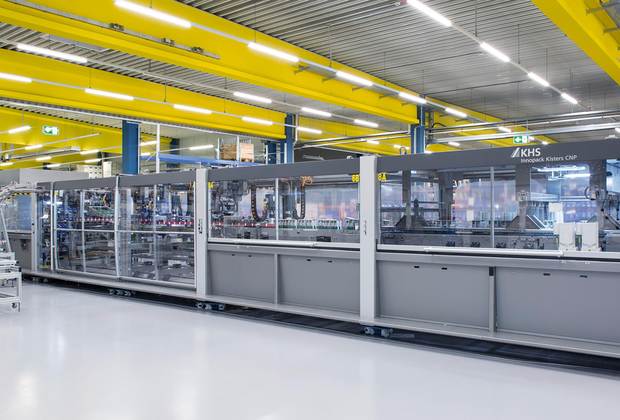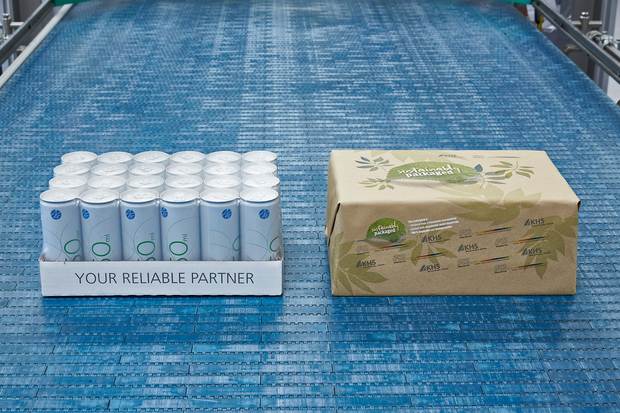The KHS sustainability report for 2019/2020 is already the fourth the company has voluntarily published since 2015. The entire content is aligned not just with GRI* standards but also with the sustainable development goals of the United Nations and legal reporting obligations pursuant to CSR-RUG**. This procedure is the result of a benchmark that has identified potential for improvement to make the voluntary report even more professional. Interested readers will thus find details on KHS’ key economic, social and ecological approaches to management in particular, plus an extended list of key figures. For the first time the sustainability report contains a section dedicated to the company’s production sites outside Germany. Besides providing information on how they perceive their responsibility to the local community, various occupational health and safety and environmental protection projects that have been successfully implemented on site are also presented. This gives readers a full insight into the entire group’s commitment to sustainability.
* GRI = Global Reporting Initiative: international, independent standards organization that defines guidelines for sustainability reports issued by large companies, SMEs, governments and NGOs.
** CSR-RUG = CSR Directive Implementation Act: in Germany, this specifies new reporting obligations, in particular for large listed companies with more than 500 employees.
On climate protection as part of KHS’ corporate strategy
»We explore all possible ways and means of cutting emissions and saving on resources in the course of our own value creation process.«
Environmental protection and product responsibility
In conversation with the four members of the Executive Management Board Kai Acker, Dr. Johannes T. Grobe, Martin Resch and Beate Schäfer, the introduction to the new report underlines that sustainability and communication at KHS are matters for the boss(es). One of the key messages of the interview is that the issues of climate protection and the circular economy are a top priority for the Dortmund systems supplier. This applies to its efforts regarding corporate environmental protection, among other concerns; for example, KHS in Germany has been using electricity from renewable sources since 2016, enabling it to save a total of 10,868 metric tons of CO2 emissions in 2019 and 2020. Regarding product responsibility, the company also helps its customers to master their respective challenges. To this end, KHS develops machine systems that center on operator protection and ergonomics and product safety and on saving on energy and resources.
On the role sustainability plays in recruiting
»At a time when companies are knocking on the doors of potential candidates rather than the other way round, sustainability can be what tips the scales.«
Nicole Pohl, senior online manager and person responsible for CSR and sustainability at KHS charged with the publication of the report, emphasizes, “We’re well aware of our responsibility in conjunction with sustainability reporting. And we want to be prepared should the obligation to produce a report be extended in the future to cover companies not listed on the stock exchange. This is why we don’t just observe internationally recognized GRI standards but have also firmly applied ourselves to the sustainable development goals (SDGs) set by the United Nations,” she explains. “Our customers and stakeholders mostly operate on a global scale and provide information on their achievements as regards sustainability according to recognized international standards. It’s thus all the more important for us that we make the same high demand of ourselves and issue statements and key figures that can be compared to others.”
On the importance of the circular economy
»For KHS, the order of the day is to reduce, reuse and recycle so that we stay ecologically and economically fit for the future.«
Modular and digital systems
Accordingly, the latest sustainability report is entitled “Global responsibility – acting reliably and with foresight”. Here, one of the particular questions addressed is how KHS can give its customers even stronger, more specific support in the implementation of their respective climate goals in the future. “Our lines and packaging systems are a major component in the customer’s value chain,” claims Pohl. “So that they function reliably for many years and thus manufacture using as few resources and with as little impact on the climate as possible, a full range of services is needed. These are intended to ensure that a customer can extend his or her system depending on requirements without having to fully invest in a new line. KHS provides a selection of modular systems and solutions for exactly this scenario – for example, the paper packer that’s now also available as a retrofit” (see the article entitled ‘One more option’).
On the impact of decentral production and customer-oriented services
»We avoid unnecessary shipping and organize procurement locally. This is both ecologically and culturally sustainable.«
KHS’ portfolio of digital and consultancy services is also being constantly further developed. “With our new digital KHS Connect customer portal, for instance, in the future we’ll not only be providing clients with a modern online shop function but also with customized information and advice on service products, conversions and optimization options specifically tailored to their machines,” Pohl states. “Germany, Austria and Switzerland and Northern and Southern Europe are already using KHS Connect. By 2022 all customers worldwide should be able to access this service.”
On corporate environmental protection at the KHS factories
»Sustainability has long been on the agenda in our production processes – in the sense of a series of small steps being taken.«
Reduce, reuse, recycle
With consumers becoming ever more critical and climate-conscious, the beverage industry is switching its focus to recyclable packaging systems and to continuously cutting CO2 emissions in the product manufacturing process in particular – not least due to increasingly restrictive legislation in the EU and many other countries. For KHS this means further reducing the amount of energy and resources consumed on its filling and packaging lines and exploiting all potential means of saving or reusing materials, such as with PET bottles. One example of this is the returnable PET bottle jointly developed by KHS and ALPLA that contains up to 35% of recyclate and at 55 grams weighs around ten grams less than conventional one-liter bottles. There is also the design of pioneering container and packaging formats that generate less and less waste or meet the growing demands of a closed-loop economy. These include Nature MultiPack, the KHS paper packer, Beyond Juice (KHS’ concept for recyclable PET bottles with barrier protection) or its most recent development CNP (see the article entitled ‘Flexible genius’).
On KHS’ indirect contribution to more sustainability
»We have a strong impact on climate protection and the circular economy with our innovative container and packaging systems.«
All of these endeavors spring from the commitment of KHS’ employees. This is why social sustainability is also highlighted in the report as a further strategic field of action at KHS. The commitment, expertise and innovative spirit needed to meet the challenges posed by demographic change and digitalization especially depend on mutual esteem and respect being shown within the company.
On sustainable corporate management
»If we achieve our corporate goals using as few resources as possible, this is good both for the environment and for our stakeholders.«
The report is divided into four main chapters on strategy and governance, product responsibility, operational ecology and social activities. These chapters present KHS’ economic, social and ecological approaches to management that are key to standardized reports. Currently, there are still some reporting limitations with respect to documentation of the key figures for the five production sites outside Germany. “The criteria and performance parameters aren’t yet fully comparable. In our next issue at the latest we want to portray all of our production sites in a uniform manner,” says Pohl.
On the changing demands made of employees
»Sustainability means that qualifications in technical jobs will change in the future, like we’re seeing in the course of digitalization.«
Any further questions?
Nicole Pohl
KHS GmbH, Dortmund, Germany
Phone: +49 231 569 1497
Email: nicole.pohl@khs.com




























